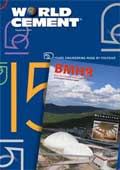Editorial comment
Two conferences are previewed this month, the XXVI Technical Congress organised by FICEM-APCAC, which is taking place in Bogotá, Colombia, and the 6th International VDZ Congress scheduled for the end of this month in Düsseldorf, Germany (see pages 20 and 74 respectively).
Register for free »
Get started now for absolutely FREE, no credit card required.
Two conferences are previewed this month, the XXVI Technical Congress organised by FICEM-APCAC, which is taking place in Bogotá, Colombia, and the 6th International VDZ Congress scheduled for the end of this month in Düsseldorf, Germany (see pages 20 and 74 respectively). It is a sign of the changes that are shaping the future of the cement industry when the Opening Addresses in both events will be given by Members of the World Business Council for Sustainable Development: Björn Stigson, the Council’s President, who will speak in Düsseldorf, and, Howard Klee, Director of the Cement Sustainability Initiative (CSI), who kicks-off proceedings in Bogotá. Sustainability is more and more taking centre stage, but then after they have made their presentations, it is back to the technical stuff, with international speakers presenting papers ranging from pyroprocessing to environmental matters, or from grinding to packing, to energy conservation. But in these gatherings, what will be said about the reshaping of the world order? Probably not a lot, as it can be argued there are other specialised meetings that cover world cement trade, shipping, and regional developments.
That’s a pity, because we see the way that equipment suppliers to the cement industry and indeed to all industries are having to fiercely compete with suppliers in countries whose economic strength and ambitions are rapidly beginning to outstrip the so-called super powers: the United States, Germany, France, the UK and the European Community. Just note how the Chinese equipment suppliers are winning contracts in the Middle East and Africa. ‘Look at the price, look at the quality!’ everybody says. Well, we will, and what’s more, we might even publish case studies from the clients who operate the cement plants in those regions to prove or disprove these claims!
It is known that new alliances are being formed. Countries that have for years had strong ties with the US, or with Europe, are turning to China, India, Russia and South Africa, where they will build stronger trade and political links. Consider, for example, a recent report in the business press noting that China’s trade with Latin America has grown at an average rate of about 40% since 2003, proof that the country has become a significant market for Brazil, Chile and Peru. Not to be outdone, India is making significant investments in software, pharmaceuticals, business software and natural resources in the region. As another example, the US has long been the main foreign market for Venezuelan oil. Venezuela provides about 10% of American oil imports, but the country’s President Chávez has repeatedly said he wants to divert his oil to China, despite the higher transport costs. Oil exports from Venezuela to China have risen from a negligible level to 398 000 b/d, and by the end of the year the level will be 500 000 b/d, this being achieved by reducing shipments to the US. Of course, as the world knows, Venezuela, together with its allies Bolivia and Ecuador, has other major issues with the US, as well as with Colombia and its allies Chile and Peru.
But away from all this, we are pleased to publish our interview with Dr Detlev Rose, the CEO of Polysius, in this month’s issue. The famous German company is celebrating its 150th anniversary this year (see page 76), and we say, here’s to the next 150 years and continued success in our ever-changing world of cement!


